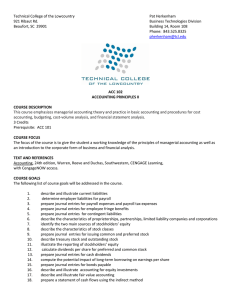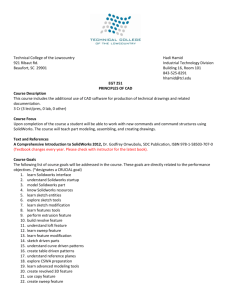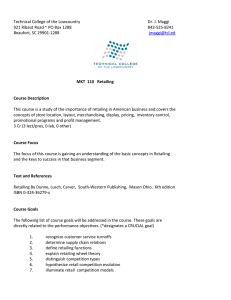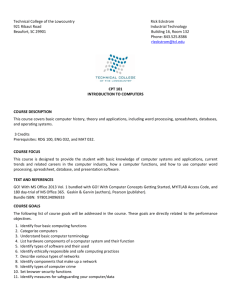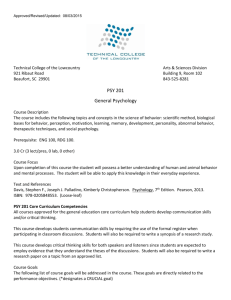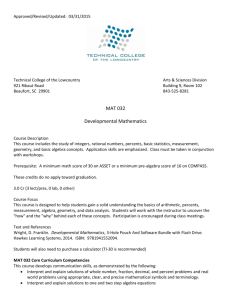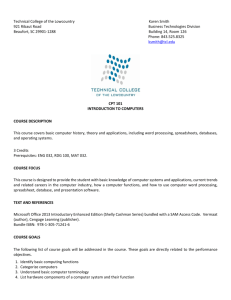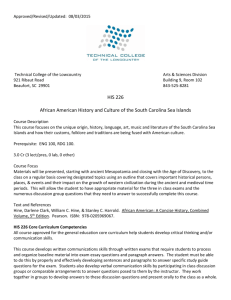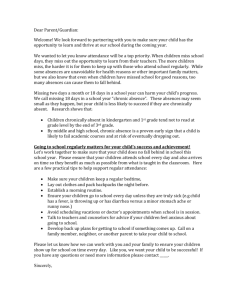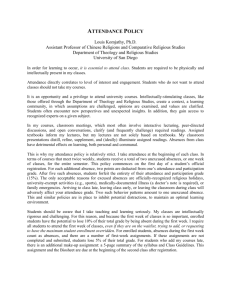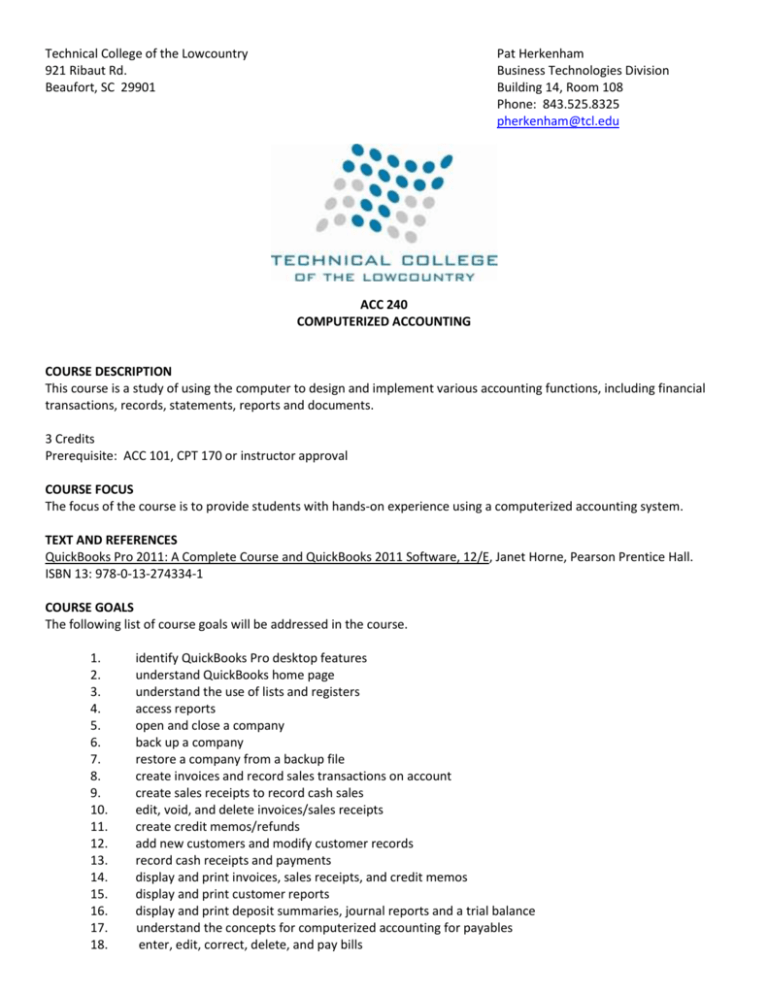
Technical College of the Lowcountry
921 Ribaut Rd.
Beaufort, SC 29901
Pat Herkenham
Business Technologies Division
Building 14, Room 108
Phone: 843.525.8325
pherkenham@tcl.edu
ACC 240
COMPUTERIZED ACCOUNTING
COURSE DESCRIPTION
This course is a study of using the computer to design and implement various accounting functions, including financial
transactions, records, statements, reports and documents.
3 Credits
Prerequisite: ACC 101, CPT 170 or instructor approval
COURSE FOCUS
The focus of the course is to provide students with hands-on experience using a computerized accounting system.
TEXT AND REFERENCES
QuickBooks Pro 2011: A Complete Course and QuickBooks 2011 Software, 12/E, Janet Horne, Pearson Prentice Hall.
ISBN 13: 978-0-13-274334-1
COURSE GOALS
The following list of course goals will be addressed in the course.
1.
2.
3.
4.
5.
6.
7.
8.
9.
10.
11.
12.
13.
14.
15.
16.
17.
18.
identify QuickBooks Pro desktop features
understand QuickBooks home page
understand the use of lists and registers
access reports
open and close a company
back up a company
restore a company from a backup file
create invoices and record sales transactions on account
create sales receipts to record cash sales
edit, void, and delete invoices/sales receipts
create credit memos/refunds
add new customers and modify customer records
record cash receipts and payments
display and print invoices, sales receipts, and credit memos
display and print customer reports
display and print deposit summaries, journal reports and a trial balance
understand the concepts for computerized accounting for payables
enter, edit, correct, delete, and pay bills
19.
20.
21.
22.
23.
24.
25.
26.
27.
28.
29.
30.
31.
32.
33.
34.
35.
36.
37.
38.
39.
40.
41.
42.
43.
44.
45.
46.
47.
48.
49.
50.
51.
52.
53.
54.
55.
add new vendors and modify vendor accounts
view and print reports for vendors
enter vendor credits
print, edit, void, and delete checks
pay for expenses using petty cash
add new accounts
display and print payables and vendors reports
complete the end-of-period procedures
change account names, delete accounts, and make accounts inactive
record depreciation and enter the adjusting entries required
record owner’s equity transactions for a sole proprietor and a partnership
reconcile the bank statement
print the trial balance, profit and loss statement and balance sheet
perform end-of-period backup and close the end of a period
enter sales transactions for a retail business
prepare invoices that use sales tax, sales discounts, and exceed a customer’s credit limit
prepare transactions using cash and credit cards
add and modify customer records
delete and void invoices
prepare credit memo with and without refunds
record customer payments on account , with and without discounts
record a transaction for a NSF check
prepare customer and sales reports
enter adjusting entries required for accrual-based accounting
enter a transactions for owner withdrawals
transfer owner withdrawals and net income to the owners’ capital accounts
reconcile a credit card statement
record transactions in a closed period
create, preview and print payroll checks
correct, void, and delete paychecks
change employee information and add a new employee
pay taxes and other liabilities
establish a company
establish a chart of accounts for a company
create lists for receivables, payables, items, customers, vendors, employees, and others
complete the payroll setup
customize reports and company preferences
STUDENT CONTRIBUTION
Students are expected to read chapters prior to class. Each student will need to complete the practice exercises in the
chapter to prepare for completing the end-of-chapter projects.
COURSE EVALUATION
There will be eight end-of-chapter problems to complete during the course for a total of 800 possible points. In
addition, there will be nine end-of-chapter tests, each worth 25 points. Grades will be earned as follows: A = 923 to
1,025, B = 820 to 922, C = 717-819, D = 615 to 716.
COURSE SCHEDULE
This class is a hybrid class, which meets for 2 lecture/presentation hours per week for 10 weeks. Students will complete
end-of-chapter problems using QuickBooks Pro 2011 Software and end-of-chapter tests using Blackboard.
Approved by: Kenneth Flick____________________________________________Developed/Revised: 5/9/2012
Ken Flick, Division Dean for Business & Industrial Divisions
ADA STATEMENT
The Technical College of the Lowcountry provides access, equal opportunity and reasonable accommodation in its
services, programs, activities, education and employment for individuals with disabilities. To request disability
accommodation, contact the counselor for students with disabilities at (843) 525-8228 during the first ten business days
of the academic term.
ACADEMIC MISCONDUCT
There is no tolerance at TCL for academic dishonesty and misconduct. The College expects all students to conduct
themselves with dignity and to maintain high standards of responsible citizenship.
It is the student’s responsibility to address any questions regarding what might constitute academic misconduct to the
course instructor for further clarification.
The College adheres to the Student Code for the South Carolina Technical College System. Copies of the Student Code
and Grievance Procedure are provided in the TCL Student Handbook, the Division Office, and the Learning Resources
Center.
ATTENDANCE
The College’s statement of policy indicates that students must attend ninety percent of total class hours or they will be
in violation of the attendance policy.
Students not physically attending class during the first ten calendar days from the start of the semester
must be dropped from the class for NOT ATTENDING.
Students taking an online/internet class must sign in and communicate with the instructor within the
first ten calendar days from the start of the semester to indicate attendance in the class. Students not
attending class during the first ten calendar days from the start of the semester must be dropped from
the class for NOT ATTENDING.
Reinstatement requires the signature of the division dean.
In the event it becomes necessary for a student to withdraw from the course OR if a student stops attending class, it is
the student’s responsibility to initiate and complete the necessary paperwork. Withdrawing from class may have
consequences associated with financial aid and time to completion.
When a student exceeds the allowed absences, the student is in violation of the attendance policy. The instructor MUST
withdrawal the student with a grade of “W”, “WP”, or “WF” depending on the date the student exceeded the allowed
absences and the student’s progress up to the last date of attendance
or
under extenuating circumstances and at the discretion of the faculty member teaching the class, allow the student to
continue in the class and make-up the work. This exception must be documented at the time the allowed absences are
exceeded.
Absences are counted from the first day of class. There are no "excused" absences. All absences are counted, regardless
of the reason for the absence.
A student must take the final exam or be excused from the final exam in order to earn a non-withdrawal grade.
A copy of TCL’s STATEMENT OF POLICY NUMBER: 3-1-307 CLASS ATTENDANCE (WITHDRAWAL) is on file in the Division
Office and in the Learning Resources Center.
HAZARDOUS WEATHER
In case weather conditions are so severe that operation of the College may clearly pose a hardship on students and staff
traveling to the College, notification of closing will be made through the following radio and television stations: WYKZ
98.7, WGCO 98.3, WGZO 103.1, WFXH 106.1, WWVV 106.9, WLOW 107.9, WGZR 104.9, WFXH 1130 AM, WLVH 101.1,
WSOK 1230 AM, WAEV 97.3, WTOC TV, WTGS TV, WJWJ TV, and WSAV TV. Students, faculty and staff are highly
encouraged to opt in to the Emergency Text Message Alert System. www.tcl.edu/textalert.asp
EMERGENCY TEXT MESSAGE ALERT
Students, faculty and staff are highly encouraged to opt in to the Emergency Text Message Alert System. Participants
receive immediate notification of emergency events and weather cancelations via text messaging on their cell phones.
Participants can also opt in to receive non-emergency news and announcements. Go to www.tcl.edu. On the
homepage, click on “emergency TextAlert at TCL” and fill out the form or go to www.tcl.edu/textalert.asp

